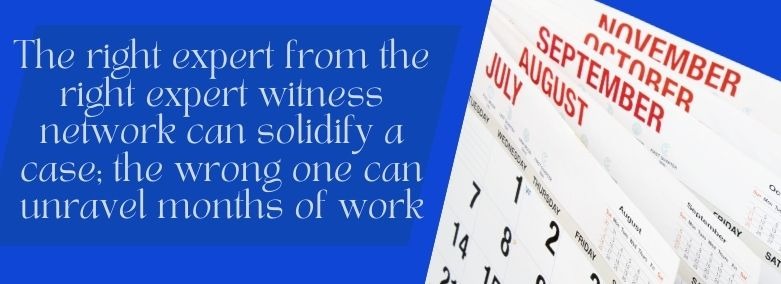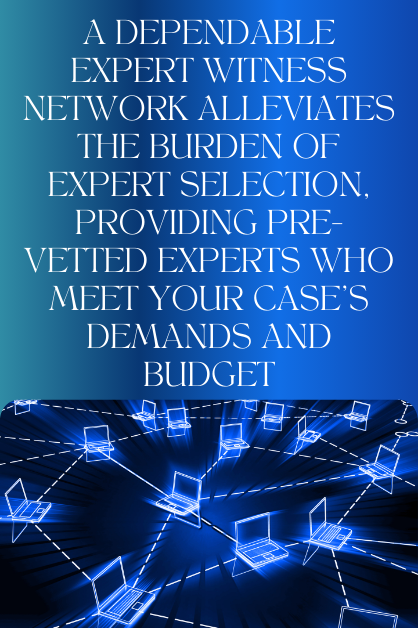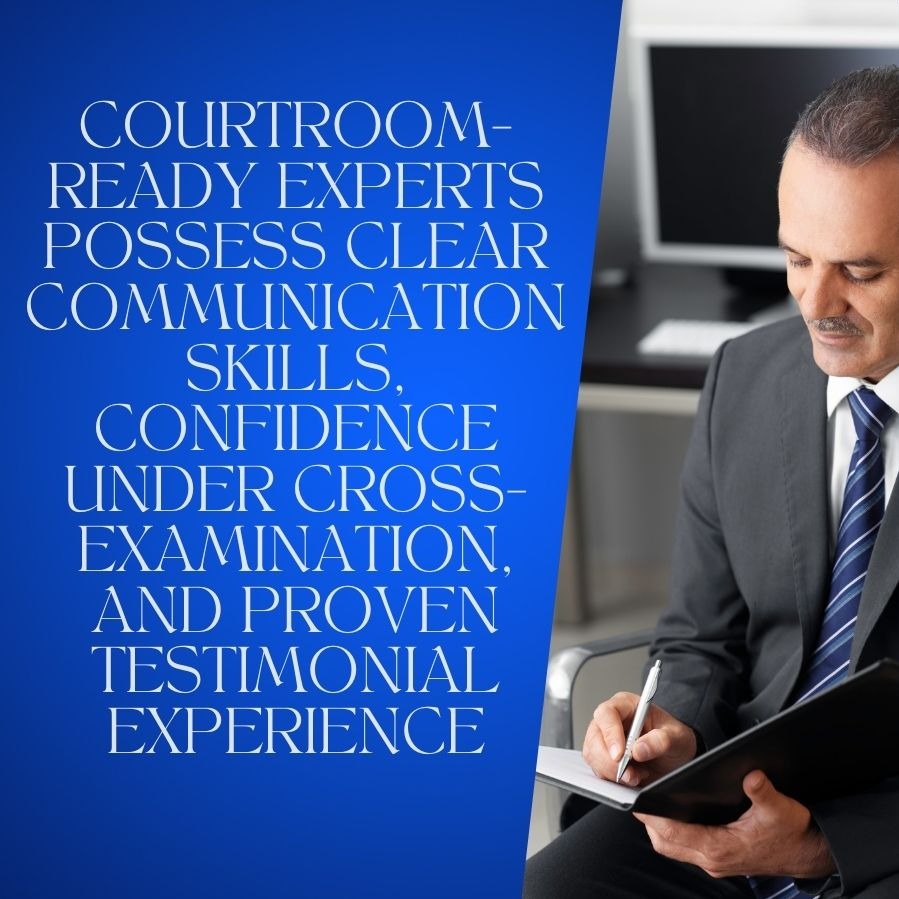The Right Expert Witness Network: A Litigation Guide
Every attorney understands that the right expert from the right expert witness network can solidify a case, while the wrong one can unravel months of work. Many lawyers, especially those managing tight timelines and limited budgets, feel the pressure to find the perfect expert, particularly for complex cases like patent disputes or corporate valuations.
This is where a dependable Expert Witness Network can make all the difference. By providing pre-vetted experts and targeted support, these networks alleviate the burden of expert selection, helping attorneys secure top-tier witnesses who meet both the specific demands of a case and budget constraints. This guide offers insights into what attorneys should look for in an expert witness network and why partnering with one can be a strategic, stress-reducing decision for their next big case.
Choosing the right Expert Witness Network can alleviate much of this pressure. A quality network not only connects attorneys with courtroom-ready experts but also ensures that these experts are pre-screened for relevant credentials, experience, and communication skills.

This article outlines the most critical factors attorneys should consider when selecting the best expert witness network to meet their case needs.
Why Use an Expert Witness Network?
An Expert Witness Network provides a streamlined, reliable way to access vetted professionals with specialized knowledge across various industries. The best networks have systems for connecting attorneys with experts who bring more than just technical expertise to the table—they bring courtroom experience, a robust background, effective communication skills, and a solid understanding of legal procedures.
1. Focus on Networks Offering Courtroom-Ready Experts
Not every expert is equipped for the courtroom. Some may excel academically or technically in their fields but struggle to communicate complex concepts in layman’s terms, particularly under the scrutiny of cross-examination. When choosing a network, it’s vital to ensure they offer courtroom-ready experts who are experienced in testifying and delivering under pressure.

Qualities of a Courtroom-Ready Expert:
Clear communication skills: An expert must simplify complex concepts for judges and juries.
Confidence under cross-examination: Experts should remain composed and persuasive, even when challenged.
Prior testimonial experience: Look for experts who have previously testified and whose performance in court has been favorably reviewed by attorneys.
Ensuring that the network provides courtroom-experienced expert witnesses helps avoid surprises and builds confidence in the witness’s performance during trial.
2. Look for Industry-Specific Expertise
When dealing with specialized cases, such as patent litigation, industry-specific knowledge can make a substantial difference. An expert witness network that specializes in connecting attorneys with professionals for patent litigation support services ensures that the expert you hire has the precise knowledge and experience required.
Types of Expertise to Consider:
Patent litigation and infringement: For intellectual property cases, a patent litigation expert witness for infringement is critical to effectively address patent validity, licensing, and damages.

Forensic accounting: Cases involving complex financial issues, such as business valuations or damage calculations, benefit from forensic accountants experienced in litigation.
Technical expertise: Industries like biotechnology or software development demand experts who understand the nuances of their field, as well as patent law.
The more relevant the expert’s experience, the more likely they are to deliver credible, impactful testimony.
3. Ensure Access to Pre-Screened Experts
Not all experts in an expert witness network are created equal. The best networks rigorously vet their experts, assessing not only their technical expertise but also their qualifications, communication skills, and prior experience in the courtroom. A vetted expert witness network saves attorneys time and ensures reliability.
What to Look for in Pre-Screened Experts:
Educational and professional credentials: Confirm the expert holds reputable degrees or certifications.
Industry experience: It’s essential for experts to have worked in the field relevant to the case.
Prior testimony and case performance: Pre-screened experts with a solid record of testimony offer an extra layer of assurance.
Selecting a network with a meticulous vetting process increases the chances that the expert witness will withstand scrutiny and provide credible testimony that strengthens your case.
4. Assess the Network’s Selection Process for Legal and Technical Fit
A network of legal expert witnesses should have a process that goes beyond simply matching attorneys with experts. The network should have a comprehensive system for evaluating both the technical and legal fit of an expert to a specific case.
Key Factors to Evaluate:
Technical expertise: Does the expert have experience that directly relates to the case’s specific issues?
Legal relevance: The expert’s testimony should be admissible under rules of evidence, such as the Daubert standard.
Flexibility and adaptability: The network should offer experts who can tailor their analysis to fit the evolving needs of the case.
When a network assesses both legal and technical alignment, it improves the likelihood that the expert will deliver testimony that is not only accurate but also admissible and relevant.
5. Consider the Network’s Support for Case Preparation
The right expert witness network doesn’t just provide experts—it supports attorneys through each phase of case preparation. In complex cases, early collaboration with experts can help attorneys strengthen their strategy.
How Expert Witness Networks Support Preparation:
Early consultation: Networks can connect attorneys with experts at the start of a case, allowing for preliminary opinions that shape the legal strategy.
Preparation for depositions and cross-examination: A supportive network will help ensure the expert is well-prepared to withstand opposing counsel’s questions.
Ongoing collaboration: Expert witness networks often provide continued support, allowing experts to remain engaged and responsive to case developments.
For cases requiring comprehensive patent litigation support services, this collaborative approach enables a stronger, more cohesive case.
6. Evaluate the Network’s Conflict of Interest Screening
A robust expert witness network will conduct detailed background checks to identify any potential conflicts of interest. A hidden conflict of interest could undermine the expert’s credibility and damage the case.
Conflict Screening Includes:
Reviewing affiliations and prior work: Checking for any previous relationships with opposing parties.
Ensuring impartiality: The expert must not hold biases that could compromise their objectivity.
Background checks: Reliable networks verify that the expert maintains a reputation for integrity.
A network that takes conflict screening seriously can help prevent surprises that could compromise the expert’s effectiveness.
7. Compare Cost Efficiency and Value
It’s no secret that hiring expert witnesses can be costly, especially for complex cases. Choosing a network that provides a range of experts with varied fee structures allows attorneys to find the best match for their budget without sacrificing quality.
How Networks Enhance Cost Efficiency:
Transparent pricing: Reputable networks will provide clear, upfront pricing.
Setting appropriate fees: Networks often categorize experts by experience level and cost, helping firms match an expert to their budget.
Avoiding costly mistakes: By providing pre-screened experts, a network helps prevent the financial impact of hiring an unqualified expert who could weaken the case.
Working with a network that emphasizes both quality and cost control allows law firms to maximize the value of their investment.
8. Consider Availability and Responsiveness
Complex cases often require an expert who can dedicate sufficient time to the case, especially if the litigation spans many months. An expert witness network should provide access to professionals who are available and committed to your case.
What to Look For:
Timely availability: Ensure the expert has the bandwidth to take on a long-term commitment.
Responsiveness: A network that prioritizes client needs will ensure their experts are accessible and responsive throughout the case.
Flexibility with case demands: Some cases may require an expert to work closely with legal teams, attending pre-trial meetings and testifying multiple times.
Choosing a network that can match you with experts who are both qualified and accessible can greatly ease the burden of complex case management.
Conclusion: Strengthening Your Case with the Right Expert Witness Network
Selecting the right expert witness can be challenging, but a trusted Legal Expert Witness Network, like ExpertConnect Litigation Support, provides attorneys with access to vetted, courtroom-ready experts who offer both technical knowledge and strong communication skills. When choosing an expert witness network, consider factors such as courtroom experience, the depth of the network’s vetting process, and the support provided for case preparation.
In today’s competitive legal landscape, a well-chosen network can make all the difference by connecting you with an expert who enhances your case, strengthens your arguments, and stands firm under cross-examination.
For attorneys aiming to maximize their chances of success, working with a network of legal expert witnesses is a strategic move that brings expertise, reliability, and peace of mind to every phase of litigation.